
A Guide to
A LSO BY K ATSUKI S EKIDA
Zen Training:
Methods and Philosophy
Two Zen Classics:
Mumonkan The Gateless Gate
and Hekiganroku The Blue Cliff Records


This condensed edition 2003 Marc Allen. Condensed from Zen Training by Katsuki Sekida 1975 Katsuki Sekida and A. V. Grimstone. Published by Weatherhill, Inc., 568 Broadway, Suite 705, New York, NY 10012
All rights reserved. This book may not be reproduced in whole or in part, stored in a retrieval system, or transmitted in any form or by any means electronic, mechanical, or other without written permission from the publisher, except by a reviewer, who may quote brief passages in a review.
Text design: Tona Pearce Myers
Library of Congress Cataloging-in-Publication Data
Sekida, Katsuki, 1903 1987.
A guide to Zen : lessons in meditation from a modern master / Katsuki Sekida ; edited by Marc Allen.
p. cm.
Includes bibliographical references and index.
ISBN 978-1-57731-249-9 (hardcover : alk. paper)
1. Zen meditations. I. Allen, Mark, 1946 II. Title.
BQ9289.5.S45 2003
294.3'4435dc21 2003009158
First printing of paperback edition, February 2013
ISBN 978-1-60868-171-6
Printed in Canada on 100% postconsumer-waste recycled paper
 New World Library is proud to be a Gold Certified Environmentally Responsible Publisher. Publisher certification awarded by Green Press Initiative. www.greenpressinitiative.org
New World Library is proud to be a Gold Certified Environmentally Responsible Publisher. Publisher certification awarded by Green Press Initiative. www.greenpressinitiative.org
10 9 8 7 6 5 4 3 2 1
CONTENTS


I HAVE MET TWO MASTERS of Zen meditation in my life. If you have met only one, you have been fortunate, for one who understands Zen is able to show us, easily and effortlessly, the power and beauty of Zen.
The first was Suzuki Roshi, the founder of the San Francisco Zen Center. The second was Katsuki Sekida, when he taught in the early 1970s at the Maui Zendo in Hawaii. There were many similarities between them: Both were older men with great physical energy and a passion for Zen, and both had an extraordinary ocean of calmness about them as well an unchanging serenity that had no bounds.
Both were undoubtedly masters, though Katsuki Sekida would probably smile and deny it if he were called that. He used to deny that he was even a teacher of Zen. He was just a layman, he said modestly. But it was undeniable, with every word and every action, that he was a great teacher. He spoke and wrote from the experience of many, many years of deep samadhi, beginning when he was quite young.
The work of both men the talks of Suzuki Roshi and the writings of Katsuki Sekida resulted in a few powerful books. Suzuki Roshis Zen Mind, Beginners Mind is excellent; so is his relatively recent book Not Always So: Practicing the True Spirit of Zen.
Katsuki Sekidas Zen Training, first published in 1975, remains a classic, one of the most comprehensive guides to Zen ever written, and his other great work, Two Zen Classics, consists of Sekidas translation and commentary on the koans the enigmatic puzzles, the brief stories studied by the Rinzai school of Zen, one of the main schools of Zen Buddhism. Both books are endless sources of insight and wisdom. I will continue to study both for the rest of my life.
I stayed at the Maui Zendo for nearly six months, and came to know and love Katsuki Sekida. He meditated with us morning, noon, and night, and while the rest of us worked in the late morning and afternoon in the garden or kitchen or in construction of a new building, he first did a vigorous series of physical exercises, then took a vigorous walk, swinging his arms wildly and widely, and then he sat perfectly straight on a stool and wrote for hours at a stretch, longhand, on big sheets of unlined paper set on an artists easel.
For several months, it was my job to type up his words. His writing was small and clear, in perfectly straight lines across the page. His English was lucid and impeccable. Though he had been born and spent almost all his life in Japan, he wrote better English than most native-born Americans. He was seventy-seven years old when I knew him, and he had more energy than most of us there and the majority of us were in our early twenties. His light was always on late into the night often until 2:30 a.m. or so and he was usually sitting on his stool, back perfectly straight, writing. Then he would get up and meditate with the rest of us at 5:30 a.m.
The articles he wrote at the time were eventually incorporated into his great work, Zen Training. The book is over 100,000 words long, and can be daunting at first to many readers. Ive often thought a smaller, condensed version of the book would be welcome to many readers and students of Zen, including myself, and when I approached the good people at Weatherhill, the publishers of both of Katsuki Sekidas books, they enthusiastically gave their permission and support for the project.
And so once again, after more than thirty years, I find myself typing up Katsuki Sekidas writing. Its a great honor. Im delighted to be able to spend so much time with his words, and offer you the gems that seem particularly shining. He attained deep samadhi in his meditation, and he carried it through every moment of his life. His words are written from the very depths of meditation, and can lead us to those depths.
I have lightly edited his words at times, usually condensing longer sentences into shorter ones, occasionally selecting simpler or clearer words or phrases. I have edited slowly and carefully the only possible way to edit words of such depth and power and hope that I have conveyed the spirit of the original in every sentence. Please forgive any errors or omissions I have made; if things arent absolutely clear to you in these pages, or if you want to explore more deeply the great original work these words are taken from, please pick up and study Zen Training. It is a masterpiece.
I pray that this book helps you in your understanding of Zen. I pray that it touches you and affects the quality of your life in countless miraculous ways.
Marc Allen
Spring 2003

Zen is not, in my view, philosophy or mysticism.
It is simply a practice of readjustment of
nervous activity. That is, it restores the distorted
nervous system to its normal functioning.
I N STUDYING Z EN, WE START WITH PRACTICE
Now, it is true that Zen is concerned with the problem of the nature of mind, so it necessarily includes an element of philosophical speculation. However, while most philosophy relies mainly on speculation and reason, in Zen we are never separated from our personal practice, which we carry out with our body and mind.
Next page
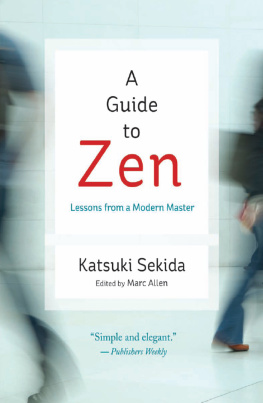


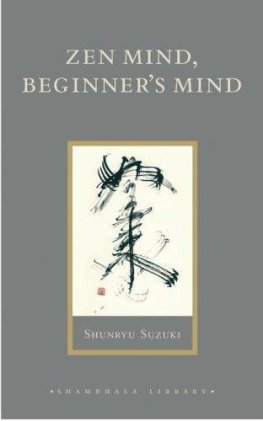
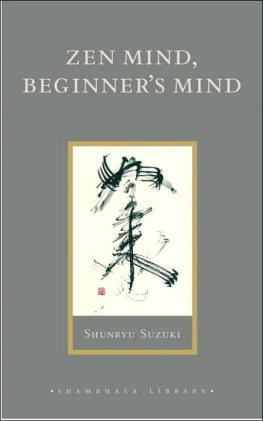
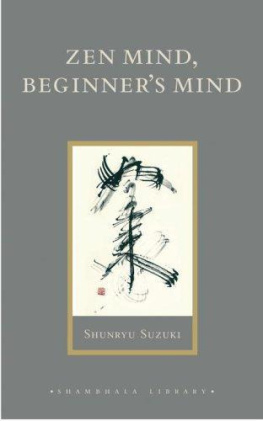
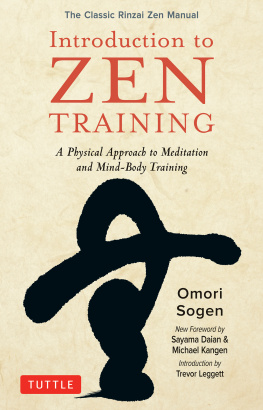
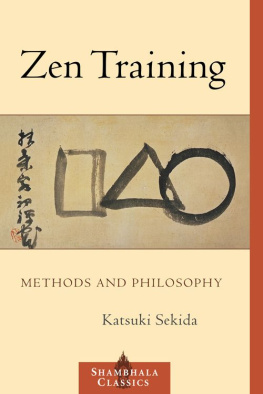

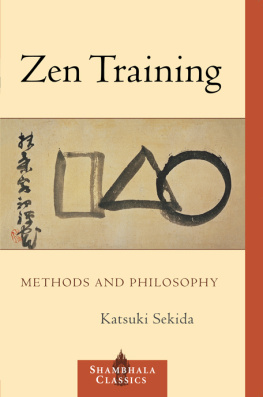




 New World Library is proud to be a Gold Certified Environmentally Responsible Publisher. Publisher certification awarded by Green Press Initiative. www.greenpressinitiative.org
New World Library is proud to be a Gold Certified Environmentally Responsible Publisher. Publisher certification awarded by Green Press Initiative. www.greenpressinitiative.org
